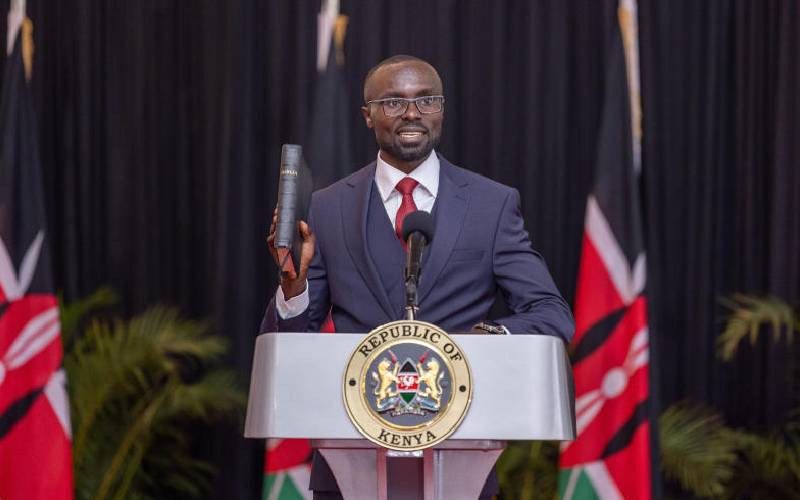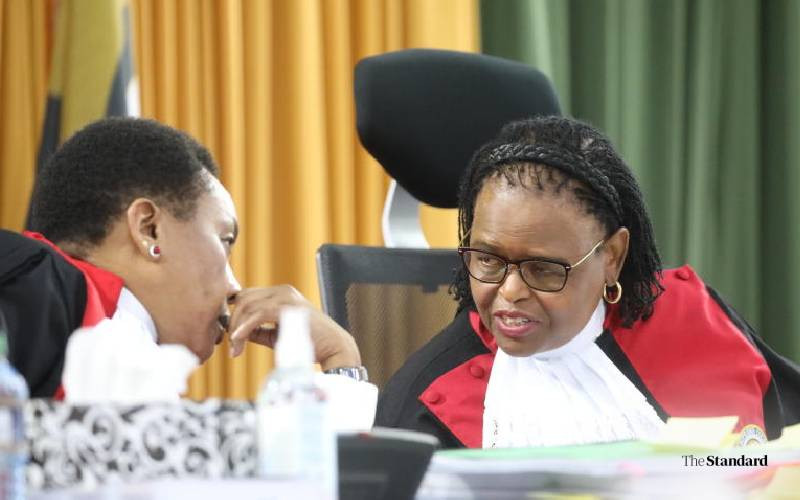 |
|
Supreme Court judges on Tuesday when they released ruling on presidential election petitions. [Photo: Ali Alale/Standard] |
By Standard Team
Nairobi, Kenya: The Supreme Court judges have recommended the investigation and possible prosecution of electoral commission officials over the acquisition of electronic voter identification kits.
“It is, indeed, likely that the acquisition was marked by competing interests involving impropriety, or even criminality. We recommend that this matter be entrusted to the relevant State agency for further investigation and possible prosecution of the suspects,” said the court.
In their long-awaited 113-page judgment made public yesterday, the judges also explain why they dismissed two petitions challenging the election of Uhuru Muigai Kenyatta as Kenya’s fourth President. The electronic devices failed countrywide during the March 4 General Election, forcing the IEBC to resort to printed voter registers known as Green Books.
Although acknowledging that there were several discrepancies in the elections and the results released on March 9, the judges are unanimous in their ruling that they were not of a scale to render the outcome invalid.
It is now up to the Director of Public Prosecutions, Keriako Tobiko to decide whether to act on the recommendations of the highest local court.
Votes cast
The six judges led by Chief Justice Willy Mutunga said there was evidence the procurement of the poll equipment was marred with impropriety and even criminal activity.
They observed that acting on their own motion (suo motu) they ordered a re-tallying of votes cast in 22 stations and found that five polling stations had discrepancies as to the number of votes cast and those reflected in Forms 34 and 36.
“Although, as we find, there were many irregularities in the data and information-capture during the registration process, these were not so substantial as to affect the credibility of the electoral process,” said the Supreme Court.
“And besides, no credible evidence was adduced to show that such irregularities were premeditated and introduced by the 1st Respondent (IEBC) for the purpose of causing prejudice to any particular candidate,” they noted.
The judges said there was evidence that the electronic equipment used in the electoral process at the beginning failed.
The court relied on the affidavit of the officer in charge of Information technology at the Commission Dismus Ong’ondi. Mr Ong’ondi said the failure mainly arose from the misunderstandings and squabbles among IEBC members during the procurement, which led to failure to assess the integrity of the technology before the vote.
The judges answered virtually every issue raised in the three petitions filed by CORD presidential candidate and former Prime Minister Raila Odinga, Gladwell Wathoni Otieno, and Zahid Rajan, and Moses Kiarie Kuria, Denis Njue Itumbi, and Florence Jematiah Sergon.
The latter won their petition to have the court declare that rejected votes should not be included in the final tally of presidential votes cast.
Stay informed. Subscribe to our newsletter
But the court defended its decision not to nullify the results of the presidential election due to the failure of electronic technology IEBC deployed.
“We take judicial notice that, as with all technologies, so it is with electoral technology, it is rarely perfect, and those employing it must remain open to the coming of new and improved technologies,” said the ruling.
Detect errors
The judges gave an analogy of traditional refereeing in football, where use of technology had encountered defects and was complemented with television monitoring to detect errors in the pitch.
“As regards the integrity of the election itself, what lawful course could IEBC have taken after the transmission technology failed?” they posed.
The judges concluded that there was no option, in their opinion, but to revert to manual registers and vote tallying as IEBC did.
The court rejected argument by the petitioner that the electoral body should have consistently used the electronic technology throughout the elections.
“From case law, and from Kenya’s electoral history, it is apparent that electronic technology has not provided perfect solutions. Such technology has been inherently undependable, and its adoption and application has been only incremental, over time,” said the judgement.
The judges pointed out that the law allows the IEBC the discretion on use of technology.
Since such technology has not yet achieved the desired level of reliability, it cannot as yet be considered a permanent or irreversible foundation for the conduct of elections.
The court reasoned: “It follows that the petitioner’s case, insofar as it attributes nullity to the presidential election on grounds of failed technological devices, is not sustainable.”
The court observed that after its own re-tallying of the votes cast in 22 stations was completed, it found that five polling stations had discrepancies as to the number of votes cast and those reflected in Forms 34 and 36.
Forms 34 were missing in some polling stations such as Zowerani Primary School, Kilifi North Constituency, Show Ground in Kapenguria Constituency, Nakatiyani Water Point in Loima Constituency, and Mjanaheri Primary School in Magarini constituency.
In addition, the aggregate results of Forms 36 for voters in 75 constituencies were missing.
Among the stations where discrepancies were recorded were Lomerimeri Primary School, Tiaty constituency; Nthambiro Primary School, Igembe Central Constituency; Kabuito Primary School, Igembe Central constituency; and NCC Social Hall, Lang’ata constituency, and Mugumoini Primary School, Chuka.
The judges said IEBC erred in including rejected ballot papers during the tallying of presidential votes in the March 4 elections.
Article 138(4) of the Constitution provides that, “A candidate shall be declared elected as President if the candidate receives more than half of all the votes cast in the election; and at least 25 per cent of the votes cast in each of more than half of the counties.”
Brief session
The Supreme Court ruled that rejected votes are invalid and cannot be included while tallying results for presidential candidates.
On March 30, the judges read a brief determination validating the election of Uhuru and declaring the polls as free and fair.
They then promised to release the detailed judgement in two weeks.
During the brief session yesterday, the judges signed the judgement in open court and handed over copies to lawyers. Electronic versions were then mailed to newsrooms and to other interested groups.
 The Standard Group Plc is a
multi-media organization with investments in media platforms spanning newspaper
print operations, television, radio broadcasting, digital and online services. The
Standard Group is recognized as a leading multi-media house in Kenya with a key
influence in matters of national and international interest.
The Standard Group Plc is a
multi-media organization with investments in media platforms spanning newspaper
print operations, television, radio broadcasting, digital and online services. The
Standard Group is recognized as a leading multi-media house in Kenya with a key
influence in matters of national and international interest.
 The Standard Group Plc is a
multi-media organization with investments in media platforms spanning newspaper
print operations, television, radio broadcasting, digital and online services. The
Standard Group is recognized as a leading multi-media house in Kenya with a key
influence in matters of national and international interest.
The Standard Group Plc is a
multi-media organization with investments in media platforms spanning newspaper
print operations, television, radio broadcasting, digital and online services. The
Standard Group is recognized as a leading multi-media house in Kenya with a key
influence in matters of national and international interest.






